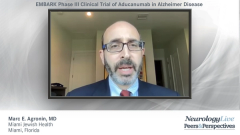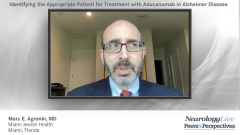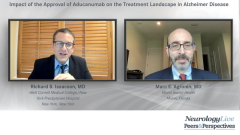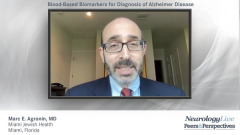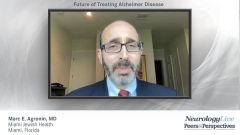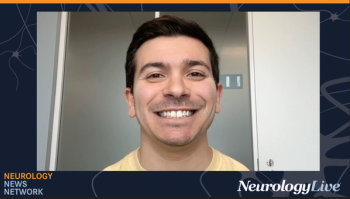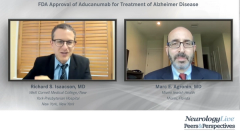
Identifying the Appropriate Patient for Treatment with Aducanumab in Alzheimer Disease
The challenges of identifying the appropriate patient, earlier in the disease course, for treatment with aducanumab for Alzheimer disease.
Episodes in this series

Richard Isaacson, MD: I have a very unique practice, as you know. In the Alzheimer's prevention clinic, we only see people in the pre-dementia phase, so we see preclinical Alzheimer's patients that we've identified as having amyloid, but no symptoms or minimal symptoms that are not even close to MCI [mild cognitive impairment]. We see people with MCI, no dementia. They can still go about their activities of daily living. We already have this very robustly well-characterized group of people, very unique, though not very common. The question that I have is how do you identify the appropriate patient? How do you in clinical practice figure out who should go on aducanumab because the label is so broad? The treatment of Alzheimer's disease to me, if I'm looking at the definition of Alzheimer's, I include stages 1, 2, and 3, but the research data only really looked at people with MCI and early Alzheimer's disease in terms of their mini-mental, or in terms of their functioning.
The other part about how I look at who is the appropriate patient, it's not just about the efficacy part and which patient group should this drug be used to promote efficacy, which is, I guess, cognitive maintenance, or cognitive improvements, or reduction of amyloid? What is the definition of efficacy? That's complicated. Who is the appropriate patient from a safety perspective? In the Alzheimer's prevention clinic, we're already doing cognitive tests every 6 months. Well, that's helpful because we can understand trajectory. In the Alzheimer's prevention clinic, we're doing APOE [Apolipoprotein E] on everybody because the APOE4 variant increases risk a little bit, not good for diagnosis necessarily, but we use it to help personalize care, it is complex, a little controversial, but we use the APOE4 variant and it's helpful for us. I know that when a person with the APOE4 variant, actually, when they have 2 of them, they may be at higher risk for ARIA [amyloid-related imaging abnormalities], for vasogenic edema, for bleeding. They need to be more cautious with the dosing. Maybe we need to have a different titration schedule? We have a label that says treatment of Alzheimer's disease. We have a label that says do an MRI [magnetic resonance imaging] at 7 months and 12 months. Well, what if a person has 2-week 4s versus E33? We have a label that is so broad. I guess this is again, a lot to talk about, but what is the appropriate patient from an efficacy and a safety perspective based on the data and based on your feelings?
Marc E. Agronin, MD: Well, to start with the efficacy front, the work you've done has really been pioneering in terms of looking at prevention. We know we need to start early and identify those individuals. Ideally, those are the individuals who we treat with this, because going back to my analogy before about the fire in the house, you want to put it out before there's a lot of damage. The brain does not repair itself as readily and as quickly as other parts of your body, we just know that. Theoretically, the earlier we catch in a rid the brain of amyloid and tau, we would imagine, now this is not based on the data we have yet, but we would imagine and want to get immersion data showing that that will actually push off the emergence of this disease. It will really slow it down, but yet, we still have to establish that. On the 1 hand, those theoretically are the ideal patients. We need more data to really support that. Years before they get symptoms, that's when we should be using this, but we haven't really identified them or diagnosed them formally as Alzheimer's disease. You've identified the key challenge. Most of the calls I'm getting are from individuals or loved ones of individuals who have moderate to severe disease because they're willing to do anything, even if this is a Hail Mary and somehow would slow it down, and yet we know that they will not be appropriate because there is no data showing it's going to have an impact at that point. The efficacy thing I think will be straightened out over time. I think it will be a combination of clinicians and working with the payers and the insurance carriers to determine what's even to be covered in the first place. I am concerned about access to diverse communities because I think that there's going to be a greater challenge there. The other thing is that centers like you, centers like me, we're not-for-profit site. In terms of being able to give these treatments, sometimes it's more challenging and there's more barriers.
The infusion sites in the community that we have to partner with, there's just a lot to be worked out. Safety is also important. On the 1 hand, I can tell you from being an investigator for every major immunotherapy trial over time, that we definitely see ARIA, whether it's vasogenic edema, or whether it's these microhemorrhages. However, most of the time it's asymptomatic. When it's symptomatic, it tends to be pretty mild. That's the good news about this. I think some of the accounts I've been reading tend to describe it a little more severe than it typically is, but usually, if we catch it, it's usually earlier than 7 months in some individuals. I have a question about waiting that long, and what if someone doesn't want to get an MRI, or what if someone can't get an MRI for some reason? What about individuals who because of a pacemaker or some metal in their body, they have early Alzheimer's disease, but you can't do an MRI? They're now ineligible for this, what do you do? Those safety issues also need to be clarified. I think what you're pointing out very clearly here is that in this first week amidst a lot of the hoopla and a lot of hope, there's so many questions and so many issues and concerns being raised that we really have to take our time to address these before rushing into wholesale treatment of individuals with this new agent.
Richard Isaacson, MD: I agree. In night 1, first night from 7:45 p.m. to at least 10 p.m., I was getting back to patients. I treat a lot of MCI patients. I have a lot of pre-clinical Alzheimer's patients. The patients I was calling back on that Monday night, every single 1, was invariably moderate to severe disease. Those are the patients that were calling, those patients that were emailing. “What can we do? I will rent an apartment in New York because we can't travel back and forth. If this is going to be it, we'll get a studio. We'll do whatever it takes.” You're exactly right. The people that are most interested at this exact moment, in those days, the sooner week, days, and weeks soon after, will be people that haven't really been shown to be effective that where the drug hasn't been tested and shown to be effective.
Marc E. Agronin, MD: The other side of the concern of mine because there are people who, for good reason are desperate. It's been almost 20 years since any approved treatment and they're willing to pay money and do what they need to do. You and I both see that they do things sometimes that have no scientific validity and they're exploited at times and they end up spending a lot of money on treatments that there's no evidence for. I'm concerned, in this case, if there will be areas in which people are just going to pay just to get it done even in those stages where it's not supported.
Richard Isaacson, MD: The other side of the coin which I think will defer for conversation at this time, maybe we can talk about this offline but pre-clinical Alzheimer's disease never been studied. We don't really have data. We have the A4 study using solanezumab in a preclinical Alzheimer's population. We have other studies the AHEAD 3-45 study which is going to be using lecanemab or BAN2401. It was the old name. Looking at more of the preclinical population, actually, they even defined it as early preclinical and I think later pre-clinical, something like that. Is this going to be used for people with pre-clinical Alzheimer's disease? When do you pull the trigger? That's off-label, or is it off-label? Because, it says the treatment of Alzheimer's and pre-clinical Alzheimer's diseases invariably Alzheimer's disease, or is it?
Marc E. Agronin, MD: That's a key point. What's on-label and what's off-label because we know how the diagnosis. It varied over time and we make clinical diagnoses without biomarkers all the time so does that count? There are no biomarker specifications.
Richard Isaacson, MD: It's going to be an interesting several weeks and an interesting several months, I think for sure.
Richard Isaacson, MD: Dr Agronin, thanks so much.
Marc E. Agronin, MD: Thank you. My pleasure.
Transcript Edited for Clarity
Newsletter
Keep your finger on the pulse of neurology—subscribe to NeurologyLive for expert interviews, new data, and breakthrough treatment updates.

